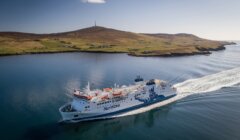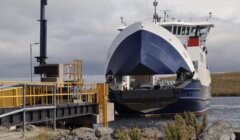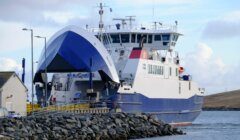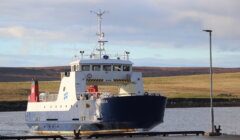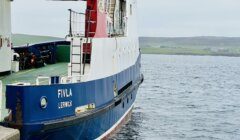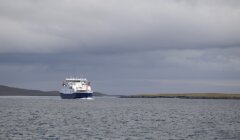Transport / Ferry resilience review report gets first airing in front of councillors
COUNCILLORS have begun discussing moves to increase the resilience of Shetland’s inter-island ferries – but a warning was made that the focus is on “trying to keep the ship afloat” rather than adding improvements to the service.
A report on ferry resilience went in front of Shetland Islands Council’s (SIC) environment and transport committee on Monday – somewhat ironically just a few days before disruption to the ferries serving Yell, Unst and Fetlar.
The full council, due to meet later this month, will be asked approve progressing a series of staffing actions, including potentially adjusting shift patterns and looking at pay and grading.
Also in the mix is exploring opportunities for the acquisition of second-hand and new vessels.
It comes against the backdrop of repeated disruption to ferry sailings this year, mainly due to a lack of crew cover – with the North Isles especially hit hard.
This has sparked a review into ferry resilience.
On Wednesday Yell Sound ran with a single vessel, while today (Friday) that route plus Bluemull Sound are both running a reduced service.
Meanwhile on Saturday evening there was set to be no ferries to or from Yell after the last run at 6.55pm, but the SIC has since confirmed that the normal timetable will now be in place.
A report to councillors noted that it has become “increasingly apparent as the [ferry resilience] review has progressed that seeking to maintain, never mind improve, the very high performance levels the ferry service delivers is likely to place unsustainable demands on existing staff and vessels”.
“Therefore actions to ensure those demands are effectively managed are essential,” it added.
SIC infrastructure director John Smith told Monday’s meeting that the objective is to keep the ferry service stabilised and make it as “robust as we can”.
Become a member of Shetland News
He said the medium and long-term solutions will stem from the SIC’s inter-island transport connectivity programme, which is being worked on at the moment, and will consider tunnels as possible ferry replacements.
“This is trying to keep the ship afloat, and continue to deliver a remarkably good service that the staff are proud of being part of,” Smith said.
He reiterated the age of the ferry fleet, the demographics of the workforce and island populations and competition from other sectors were a continued challenge.
A report to councillors said nearly 70,000 crossings a year are undertaken by the SIC’s 11 ferries plus the Foula vessel, which is outsourced.
In total, 97.22 per cent of services to and from Shetland’s islands ran to timetable between June 2023 and May this year.
The majority of cancellations were the result of weather.
But Shetland West councillor Mark Robinson said the disruption caused by the non-weather related cancellations was “huge”, despite the low percentage.
He noted the negative publicity the council received from disruption earlier in the year, and added that he himself had to turn back at Toft along with visitors after giving up on the idea of going to Unst.
“But we weren’t alone, and we really need to make sure whatever we put in place that we don’t end up in that situation again next summer,” Robinson said.
“The businesses in Yell and Unst are seeing a huge hit from this, and I daresay Whalsay is the same when you only have one vessel.”
Smith had said that he felt the crews were doing “remarkably well” to continue to deliver the service.
But he warned: “Trying to keep at the level we’re at even is a challenge and one that we need to be conscious of.”
Meanwhile ferry operations manager Andrew Inkster confirmed the council continues to hold an interest in another vessel, which he said may become available in the future.
Other vessels have been looked at too, but were deemed unsuitable.
Concern was raised by North Isles member Robert Thomson about the lack of spare ferries in the local fleet when one has to go to dry dock – such as how the “spare vessel” Fivla is set for a two-month spell on the sidelines soon.
A report given to councillors also included market values of the SIC fleet, with the ageing Fair Isle ferry Good Shepherd – which is due to be replaced – at the bottom of the pile (£200,000) and the newest vessels, Yell Sound’s Dagalien and Daggri, valued at £7.5 million each.
Estimates for new build replacements were also given – ranging from £4 million to £6 million for the Good Shepherd to between £20 million and £30 million for the newer ferries.
A consultant working on a review of the fleet highlighted that vessels should ideally be replaced at 25 years of age, and that no vessels should be operating after 40 years of age.
Whalsay ferry Hendra is 42 and Papa Stour’s Snolda is 41. Only three of the fleet are under 25 – the Dagalien, Daggri and Filla.
Inkster also told Monday’s meeting that the service is effectively full up for deck trainees, but the engineering side is more complicated.
There remains long-term vacancies in the service which are having to be covered by agency staff.
Shetland News recently reported that the bill for agency staff reached nearly £640,000 in 2023/24.
Ferry agency staff bill reached nearly £640k last financial year
Committee chair Moraig Lyall asked if the recruitment process was as “slick and streamlined” as it could be – with Inkster confident over the processes.
But he admitted the team is “up against it” and said things could always be slicker.
Inkster also reminded councillors that issues with finding maritime staff was a national problem, not just local.
During debate SIC leader Emma Macdonald said the ferry service should be a priority for the council.
Thomson also noted the effect disruption can have on island businesses, particularly in tourism.
“Tunnels hopefully will be the final solution..but that’s going to be a number of years away,” the North Isles member said.
Meanwhile Lyall said a “well functioning transport network” underpins the delivery of the rest of the SIC’s services – as well as business and economy.
The report to councillors noted the performance of the ferries in 2023/24 compared to other transport operators in Scotland, including NorthLink, CalMac and Loganair – with the SIC service topping the table when it came to the lowest cancellation rate.
However, Lyall said elsewhere there are alternative modes of transport – such as using the boat south if Loganair flights are disrupted, or how there are various options for travel on the mainland – but there is no other back-up to the SIC’s inter-island ferries.
As such, Lyall said “getting this right is really important” and added her desire to see the report’s recommendations being moved ahead as soon as possible.
Become a member of Shetland News
Shetland News is asking its many readers to consider paying for membership to get additional features and services: -
- Remove non-local ads;
- Bookmark posts to read later;
- Exclusive curated weekly newsletter;
- Hide membership messages;
- Comments open for discussion.
If you appreciate what we do and feel strongly about impartial local journalism, then please become a member of Shetland News by either making a single payment, or setting up a monthly, quarterly or yearly subscription.






































